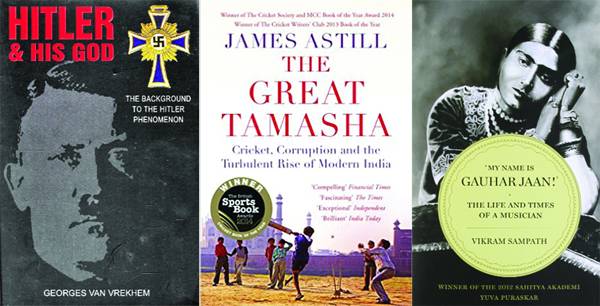
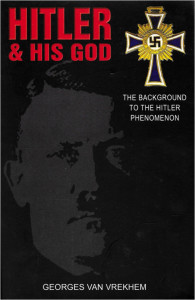
Hitler & His God
Georges Van Vrekhem
Rupa (paperback), 2006
PRs 1195
Hitler remains an enigma in spite of everything that has been written about him. Historians like Alan Bullock, Ian Kershaw and HR Trevor-Roper confess their perplexity openly. How was it possible that an unknown, solitary and future-less front-soldier in 1918 became, some years later, the leader and messiah of the German people? How could a nullity unleash the most destructive and deadliest war humanity has ever known? Academic historians give countless reasons because the essential reason keeps escaping them; fantasy writers find the most bizarre occult explanations, disregarding the historical facts. Georges Van Vrekhem has studied the literature in German, English, French, Dutch and Italian for several years. His conclusion is clear: in Hitler there must have been a cause equivalent to the effects of his actions. Van Vrekhem gives a revealing picture of the rise of the unknown Austrian corporal and brings to life the people who helped him in the saddle: Dietrich Eckart, Captain Mayr, General von Mohl, and many others. The author analyses Mein Kampf, the book in which Hitler laid bare his thoughts and intentions without being believed. And he shows how this “man from nowhere”, driven by the obsession of his mission and helped by incredible luck, managed to become the Führer.
To explain the foundations of a people who made Hitler possible, Van Vrekhem undertakes, in the book’s second part, a deep-probing analysis of the historical background. In this he gives a surprisingly clear picture of the German ambition, the racism, which supported it, and the romantic youth movements, which incorporated the racism. In a memorable chapter he sketches the history of the German Jews. And he shows another side of the German people: their longing for a better world, although vitiated by their sense of superiority. All this brings Georges Van Vrekhem to his central theme: Hitler’s possession by the “god” who inspired him, guided him, brought him to power - and dropped him when no longer needed.
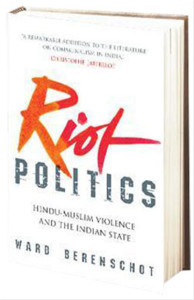
Riot Politics
Ward Berenschot
Rainlight Rupa (hardback), 2013
PRs 990
On 27 February 2002, fifty-eight people died when a coach of the Sabarmati Express was set on fire just outside a small-town railway station in Gujarat. The incident sparked the Gujarat riots, one of the worst outbursts of Hindu-Muslim violence in recent history. Based on an extensive ethnographic study of Gujarat s local politics, Riot Politics offers a novel approach to understanding the processes that foster outbursts of communal violence in India. Berenschot argues that the difficulties faced by poorer citizens when dealing with state institutions underlie the capacity and interests of political actors to instigate and organise communal violence.
As the reader is led into the often shadowy world of local politics in Gujarat, the author reveals how the capacity and willingness of various types of rioters ranging from politicians, local criminals, fundamentalist groups, to neighbourhood leaders and police officials to organise and perpetrate violence is closely related to the different political positions these actors hold.
The book explores how communal or ethnic riots are meticulously planned and executed even though they appear to be spontaneous outbursts of violence.
Focusing on Ahmedabad, it unravels the Gujarat riots from a grassroots level, exploring and analyzing the role played by small time neighbourhood agents who worked for the government.
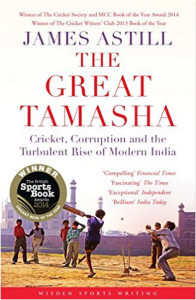
The Great Tamasha
James Astill
Wisden Sports Writing (paperback), 2013
PRs 795
On a Bangalore night in April 2008, cricket and India changed forever. It was the first night of the Indian Premier League - cricket, but not as we knew it. It involved big money, glitz, prancing girls and Bollywood stars. It was not so much sport as tamasha: a great entertainment.
The Great Tamasha examines how a game and a country, both regarded as synonymous with infinite patience, managed to produce such an event. James Astill explains how India’s economic surge and cricketing obsession made it the dominant power in world cricket, off the field if rarely on it. He tells how cricket has become the central focus of the world’s second-biggest nation: the place where power and money and celebrity and corruption all meet, to the rapt attention of a billion eyeballs.
Astill crosses the subcontinent and, over endless cups of tea, meets the people who make up modern India - from faded princes to back-street bookmakers, slum kids to squillionaires - and sees how cricket shapes their lives and that of their country. Finally, in London he meets Indian cricket’s fallen star, Lalit Modi, whose driving energy helped build this new form of cricket before he was dismissed in disgrace: a story that says much about modern India.
The Great Tamasha is a fascinating examination of the most important development in cricket today. A brilliant evocation of an endlessly beguiling country, it is also essential reading for anyone who wants to understand the workings of modern India.
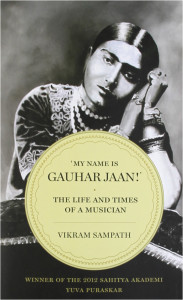
My Name is Gauhar Jaan: The Life and Times of a Musician
Vikram Sampath
Rupa (paperback), 2010
PRs 790
The earliest recordings of Indian music are characterised by the high-pitched announcement, my name is Gauhar Jaan. This declaration epitomised a milestone in the history of Indian classical music, one that would forever change its content, structure and style.
The musical scene in India at the turn of the 20th century witnessed tumultuous changes. The traditional custodians of the art form, the devadasis in the south, and the nautch girls in the north, who had nurtured the art for centuries, became victims of the morality laws of the British government and the prudery of an enlightened Indian elitist class. Gauhar Jaan (1873-1930), however, an eminent Hindustani vocalist, symbolises the resurgence of women musicians of her era.
Born Eileen Angelina Yeoward, an Armenian Christian who later converted to Islam, Gauhar Jaan was a naturally gifted musician with an outstanding repertoire. One of the earliest women artists to seize the opportunities that rose with the advent of recording technologies, hers was the first Indian voice to ever be recorded in 1902. She went on to cut close to 600 records, the most successful female musician of her time.
This book traces her story, a story peppered with the stuff myth and legend, as well as the times during which she lived. It also describes the evolution of the Indian recording industry and its impact on the country s music, theatre and social life.
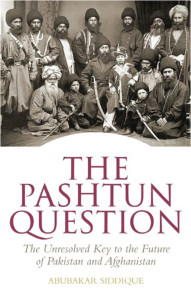
The Pashtun Question: The Unresolved Key to the Future of Pakistan and Afghanistan
Abubakar Siddique
Hurst (hardback), 2014
PRs 995
Most contemporary journalistic and scholarly accounts of the instability gripping Afghanistan and Pakistan have argued that violent Islamic extremism, including support for the Taliban and related groups, is either rooted in Pashtun history and culture, or finds willing hosts among their communities on both sides of the Afghanistan-Pakistan border. Abubakar Siddique sets out to demonstrate that the failure, or even unwillingness, of both Afghanistan and Pakistan to absorb the Pashtuns into their state structures and to incorporate them into the economic and political fabric is central to these dynamics, and a critical failure of nation- and state-building in both states. In his book he argues that religious extremism is the product of these critical failures and that responsibility for the situation lies to some degree with the elites of both countries. Partly an eyewitness account and partly meticulously researched scholarship, The Pashtun Question describes a people whose destiny will shape the future of Pakistan and Afghanistan.

